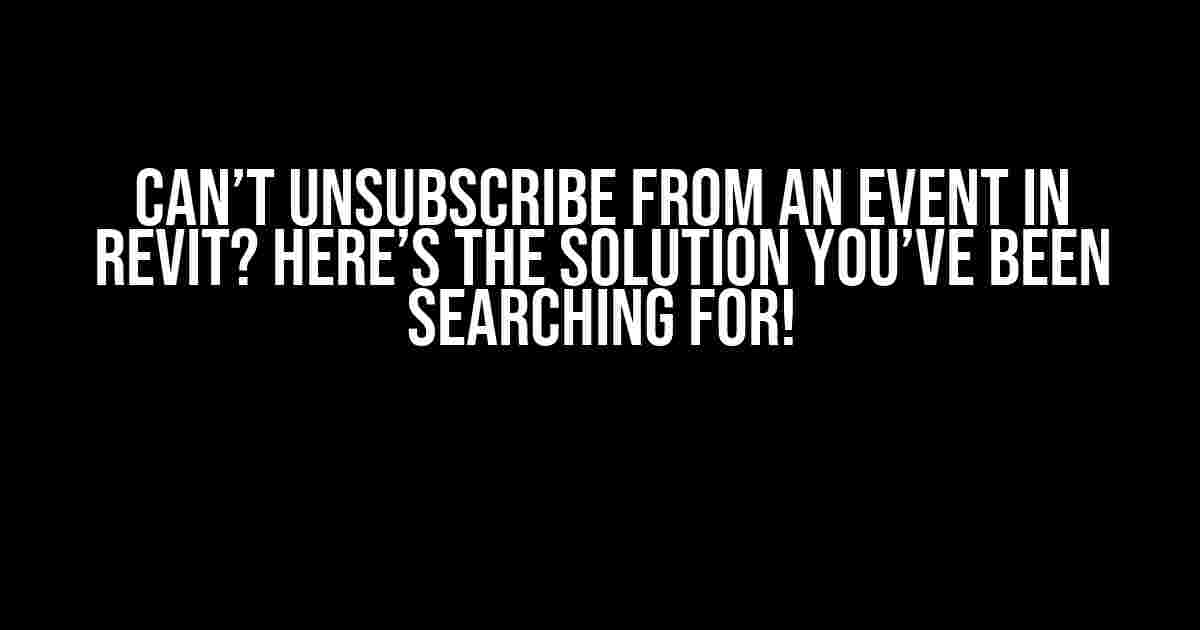Are you tired of dealing with pesky event subscriptions in Revit that just won’t quit? You’re not alone! Many Revit users have struggled with this issue, but fear not, dear reader, for we have the solution you’ve been searching for. In this article, we’ll dive into the world of events and event handlers in Revit, and provide you with a step-by-step guide on how to unsubscribe from those pesky events.
What are Events and Event Handlers in Revit?
Before we dive into the solution, let’s take a quick look at what events and event handlers are in Revit. Events are notifications that occur within the Revit API when certain actions take place, such as a document being opened or a selection being made. Event handlers, on the other hand, are methods that respond to these events and perform specific actions.
// Example of an event handler in Revit
public void OnDocumentChanged(object sender, DocumentChangedEventArgs e)
{
// Code to be executed when the document changes
}
In Revit, events and event handlers are used extensively to customize the behavior of the software. However, when not handled properly, they can lead to issues like the one we’re trying to solve today.
The Problem: Can’t Unsubscribe from an Event
So, you’ve subscribed to an event in Revit, but now you want to unsubscribe. You’ve tried everything, but that darn event just won’t go away! The reason for this is that Revit’s event system uses a mechanism called “weak referencing” to manage event subscriptions.
Weak referencing is a technique used to prevent memory leaks in .NET applications. In the context of events, it means that when you subscribe to an event, Revit doesn’t maintain a strong reference to the event handler. This allows the garbage collector to clean up the event handler when it’s no longer needed.
The problem arises when you want to unsubscribe from an event. If you simply set the event handler to null, Revit won’t release the reference to the handler, and the event will continue to fire. This is where things get tricky!
The Solution: Unsubscribing from an Event in Revit
So, how do you unsubscribe from an event in Revit? The answer lies in using a technique called “unregistering” the event handler. Unregistering an event handler is the process of removing the handler from the event subscription list, effectively canceling the subscription.
To unsubscribe from an event in Revit, follow these steps:
-
Get a reference to the event handler you want to unsubscribe from.
-
Use the -= operator to unregister the event handler from the event.
// Example of unregistering an event handler
DocumentChangedEventHandler handler = (sender, e) => { /* event handler code */ };
App.DocumentChanged -= handler;
-
Set the event handler to null to release any remaining references.
handler = null;
By following these steps, you’ll successfully unsubscribe from the event and prevent any further notifications from being sent to the event handler.
Best Practices for Managing Events in Revit
To avoid getting stuck in the vicious cycle of event subscriptions, follow these best practices:
-
Use weak events: Revit’s event system is designed to work with weak events. By using weak events, you can ensure that your event handlers are garbage collected when no longer needed.
-
Unregister event handlers: When you’re done with an event handler, make sure to unregister it to prevent memory leaks.
-
Avoid using static event handlers: Static event handlers can lead to memory leaks and make it difficult to unsubscribe from events.
-
Keep event handlers short and sweet: Long-running event handlers can cause performance issues and make it difficult to debug problems.
Troubleshooting Common Issues
Even with the best practices in place, issues can still arise. Here are some common problems you might encounter and their solutions:
| Issue | Solution |
|---|---|
| The event handler is still being called after unsubscribing. | Check that you’ve unregistered the event handler correctly using the -= operator. |
| The event handler is not being garbage collected. | Verify that you’ve set the event handler to null after unregistering it. |
| Multiple event handlers are being called for a single event. | Check that you’re not subscribing to the same event multiple times. Use a single event handler for each event. |
Conclusion
In conclusion, unsubscribing from an event in Revit can be a challenge, but with the right techniques and best practices, you can avoid common pitfalls and ensure a smooth development experience. By following the steps outlined in this article, you’ll be well on your way to mastering events and event handlers in Revit.
Remember, a well-designed event system is crucial for building robust and scalable applications in Revit. By keeping your event handlers short, sweet, and well-managed, you’ll be able to tackle even the most complex tasks with ease.
So, the next time you’re faced with the dreaded “Can’t unsubscribe from an event” issue, don’t panic! Just follow the steps outlined in this article, and you’ll be back to developing in no time.
Happy coding, and see you in the next article!
Here are 5 Questions and Answers about “Can’t unsubscribe from an event in Revit” in a creative voice and tone:
Frequently Asked Question
Stuck in an event loop in Revit? Don’t worry, we’ve got you covered!
Why can’t I unsubscribe from an event in Revit?
When you subscribe to an event in Revit, the event handler is stored in memory until you explicitly unsubscribe from it. If you don’t unsubscribe, the event handler will remain active, causing issues. Make sure to unsubscribe from events when you’re done with them!
How do I properly unsubscribe from an event in Revit?
To unsubscribe from an event, use the -= operator in C# or the RemoveHandler method in VB.NET. For example, `myEvent -= myEventHandler;` or `RemoveHandler myEvent, AddressOf myEventHandler`. Simple, right?
What happens if I don’t unsubscribe from an event in Revit?
If you don’t unsubscribe from an event, it can lead to memory leaks, as the event handler remains active in memory. This can cause performance issues, crashes, and even data loss. Yikes! So, always remember to unsubscribe when you’re done.
Can I use a using statement to automatically unsubscribe from an event in Revit?
Unfortunately, no. The using statement in C# is used for objects that implement the IDisposable interface, which doesn’t apply to events. You need to explicitly unsubscribe from events using the -= operator or RemoveHandler method.
Are there any best practices for event handling in Revit?
Yes! Always subscribe to events in the initialization method, and unsubscribe in the cleanup method. Keep your event handlers short and sweet, and avoid complex logic. Finally, use a consistent naming convention for your events and event handlers. Happy coding!


